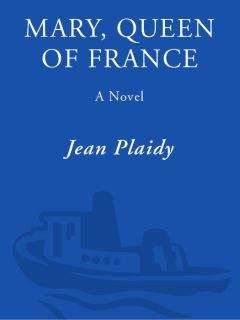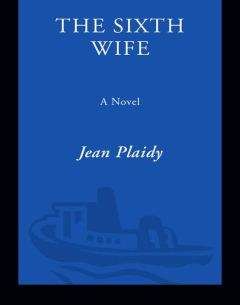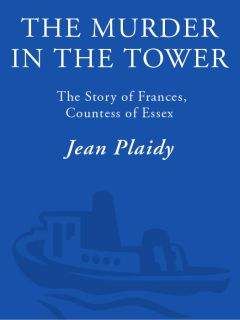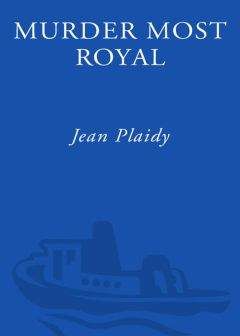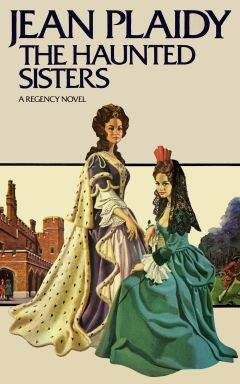Jean Plaidy - To Hold the Crown: The Story of King Henry VII and Elizabeth of York
Whenever she saw him he was aware of her; he smiled at her possessively but she fancied there was that in his eyes which demanded gratitude. She was grateful, for she knew that by being kind to her he went against his father’s wishes; but common sense told her that even the Prince of Wales must know that he would marry her only if some other irresistible project did not turn up. She had heard it whispered that Eleanor of Castile was being suggested for him.
The only consolation was that she would know soon.
Then came the terrible news from Spain. Philip and Juana had arrived in Castile where the Cortes had accepted Juana as the Queen; Philip was given the rank only of consort, which would not please him. In vain had he protested that Juana was mad; the people of Castile accepted her as the daughter of the great Queen Isabella, their true Queen. Philip had to realize, Archduke of Austria that he was, that he was only the consort of the Queen of Castile.
There was another menacing figure in the background too. That was Ferdinand. Henry had often smiled to himself as he contemplated his old enemy. How did Ferdinand feel—he who, through Isabella, had been King of Castile, and now found himself only King of Aragon?
Philip undoubtedly had his enemies, and tragedy struck him at Burgos. No one was quite sure how it happened, but it was believed that it started at a ball game—at which Philip excelled. Being hot from the game, he called for refreshment and drank very deeply from the cup which was brought to him. Soon afterward he began to feel ill, and when people asked each other who had brought that cup to him, no one could remember. Philip was very ill and remained so for some days. Juana herself had nursed him. Katharine heard that she had changed during that time of sickness. Intense as her anxiety was, yet she grew calm and nursed Philip night and day allowing none but herself to supervise the preparation of his food. In spite of her care, one morning she discovered black spots on his body and during that day he died.
They said he had died of a fever but everyone suspected poison. The matter was not investigated very thoroughly because it was remembered that Ferdinand’s envoy had been in Burgos at that time; and with Philip dead, Charles a child, and Juana mad, Ferdinand would become Regent of Castile.
King Henry was astounded by the news. The Prince of Wales shed tears. Philip had been so young, so handsome, so vital, that it was impossible to think of him dead . . . and almost certainly by poisoning. Young Henry wanted to go to Burgos to sift the matter, to find the murderer and inflict terrible tortures on him. “He was my friend,” he said. “We loved each other.”
Charles Brandon was a little cynical, but he did not voice his thoughts. People were beginning to be careful what they said to the Prince.
The King was thinking: that schemer Ferdinand will be in control now. And he wondered what would happen about those plans he had discussed with Philip during his enforced stay in England. What of the bonds of friendship; what of the marriage with Archduchess Margaret?
He was soon to hear that Margaret did not wish to marry the ageing King of England, and he was sure that the proposed marriage between Eleanor of Castile and young Henry would be pushed aside now that Ferdinand would be in control.
What had come out of all the lavish entertainments given to Philip? Henry groaned at the thought of the cost. And what had been gained? He had spent so much time, energy and above all money cultivating the friendship of a man who had died before the year was out.
It seemed that all the good that had come out of that visit was the return of Edmund de la Pole, who was now the King’s prisoner in the Tower.
The King was feeling very weary. His rheumatism was worse; his skin was turning yellow; and he felt ill for a great part of the time.
If I could find a wife, he thought, I should be rejuvenated. It was amazing that with all he had to offer—a crown no less—it should be so difficult to find anyone who wanted it.
Why? Was this an indication of what people were thinking about his hold on that glittering and most desired object?
His friends and ministers implied that he was not his usual wise self in allowing this obsession with holding the crown to play such a big part in his life. They had implied that he had it firmly in his grasp. He had brought much good to England. He had taxed the rich until they groaned and complained bitterly; but he had a strong economy; he had a prosperous country; and if he demanded taxes from all those who could afford to pay them—as well as from those who could not—he had never lived extravagantly. None could say that the money squeezed from his long-suffering subjects was spent on his own amusements. He was never extravagant unless deep consideration told him that it was wise to be so. Money was only spent if it could bring back gains which exceeded the expense.
And then suddenly he had the idea. Juana! She was a widow now. She was very attractive—quite a beauty in fact. She was Queen of Castile. Why should she not come back to England as his bride?
He sent for Dr. de Puebla and sounded him.
De Puebla had aged considerably and the damp climate of England had not been good for his health. Yet he stayed on knowing that his position as the go-between and friend of the King of England, though he served a Spanish master, was more interesting and remunerative than anything he could have attained in Castile.
De Puebla was a little taken aback at the King’s suggestion.
“My lord . . . she is but recently widowed. She is not quite balanced as you saw for yourself. Moreover she remains so enamored of her late husband that she has had him embalmed and carries his coffin about with her wherever she goes. She has just given birth to a daughter. . . . It seems hardly the time. . . .”
Hardly the time! Time was a sore point with the King. He could feel it slipping away from him. He must get a wife quickly.
“She has shown that she is fertile,” said the King. “She is beacutiful. She pleases me very much.”
“My lord, you know of her mental instability.”
“Mental instability does not prevent the bearing of children. I want sons, and I want a wife quickly to bear them for me.”
“I will acquaint King Ferdinand with your wishes,” said de Puebla.
“And you will tell him what an excellent prospect this is for his daughter. She will be Queen of England.”
“A title he hoped for another of his daughters,” said de Puebla. He had long deplored his inability to bring about that marriage. He knew that Ferdinand relied on him to do so; but all he had been able to report was the continual bickering about the dowry.
“That is another matter,” went on the King. “If Ferdinand will not pay the remainder of that long-overdue dowry I shall have to consider the match between his daughter Katharine and my son at an end.”
Ah, thought de Puebla. He desperately wants marriage with Juana. Can this be used as a bait to bring about the marriage between Katharine and the Prince of Wales?
Katharine was cheered a little during those months. The King had written to her saying that he loved her and could not endure to think of her worried about money; he enclosed two hundred pounds, which he trusted would be of some help to her.
Katharine smiled wanly. She knew what was going on. Scraps of gossip came to her. The King was hoping to marry Juana and was in correspondence with her father because of this. The longstanding trouble about the nonpayment of the dowry would be revived and it was clear that hoping for Juana, the King was realizing that he must still hold out the possibility of a marriage between Katharine and the Prince of Wales.
It was all very cynical but she supposed she must be grateful for help, for whatever reason it was given.
Ferdinand, long disappointed and suspicious of de Puebla, replaced him by Don Gutierro Gomez de Fuensalida who was very different from his predecessor—elegant, courtly, in fact what was expected of a Spanish ambassador, and one who had already served Ferdinand at the Courts of Maximilian and Philip, so he was known to be skilled in diplomacy.
Negotiations dragged on. Ferdinand sent word that Juana who was after all Queen of Castile refused to be parted from her late husband’s coffin and wherever she went it was taken with her. She could scarcely be expected to consider another marriage while she was in that state.
But the King continued to plan. It was as though he were clinging to Juana as his last hope. He was quite ill during the beginning of the year and the Prince of Wales began to behave as though he already wore the crown. He was no longer a boy and people were saying it could not be long now before he was the King.
If the older Henry was hoping desperately for a bride the young one was longing to put the crown on his own head.
Maximilian agreed that his grandson Charles should have the King’s youngest daughter, Mary. There were grand celebrations because of this and Katharine was seen in the tiltyard seated beside the King and he was heard to refer to her as his daughter.
It was spring of the year 1508 when the English emissary whom Henry had sent to Castile to find the real truth behind the diplomacy returned with the news that Ferdinand had secretly announced that he had no intention of allowing Juana to marry anyone. She was mad; and he was going to rule Castile in her name.
Henry was incensed.
He was feeling more and more wretched. He had emerged from the winter more or less crippled with rheumatism; he was in constant pain and none of his physicians could alleviate it. His temper, which for so long he had kept admirably under control, broke out.
The Prince of Wales came to him one day and found him glowering over one of the dispatches which had just arrived from his man in Castile.
He began to shout suddenly. “Ferdinand is playing with me. He has no intention of sending Juana here. He has cheated me . . . lied to me. Katharine has not helped. She has been telling her father of my ill treatment. They have no intention of giving me my bride. . . .”
The Prince of Wales looked at the poor man his father had become. He was no longer afraid of him. The crown was fast slipping out of the old man’s grasp. That which he had feared ever since he had seized it was about to come to pass, only it was not some claimant to the throne who would snatch it from him. It was Death.
I am all but King, thought young Henry. It cannot be long now.
He said: “It seemed clear from the start that Ferdinand would not agree to the match . . . nor would Juana.”
“What do you mean?” cried the King. “We have been negotiating. . . .”
“But never seriously on their side. Ferdinand had no intention . . .”
“What do you know of these matters? You are but a boy.”
“A boy no longer, my lord.” Henry looked pityingly at the shrunken man with the swollen joints who moved so painfully in his chair and he felt his own glorious youth urging him to escape his shackles. “I am aware of what goes on. And of what importance is this Spanish marriage? Juana is mad and you, my lord, are too old for marriage.”
“Too . . . old for marriage . . .,” spluttered the King.
“Indeed it is so. It is . . .”
The Prince stopped short, suddenly halted by the look of intense fury in his father’s pale eyes.
“How dare you!” cried the King. “You . . . you . . . young coxcomb . . . how dare you!”
“I . . . I . . . only spoke what I thought to be the truth.”
“Go from me,” said the King. “You have too high an opinion of yourself. You are a brash boy . . . nothing more. Take care. I am not yet in my grave remember, and the crown is not yet on your head. Go, I say. You offend me.”
The Prince retired with all speed. He was alarmed. He had felt the power of the King in that cold gaze and he was afraid that he was planning to take some action against him.
After his son had gone the King sat for a long time in silence, staring ahead of him.
The King’s health improved a little. The Prince was docile, making sure to obey his father in every respect. Nothing was said of that scene between them; but the two of them watched each other warily.
The King was too much of a realist not to admire his son. Henry had the makings of a king and he should be grateful for that. He would consolidate the House of Tudor. If he could curb his vanity, his extravagance, learn the true value of money he would do well enough.
As for the Prince he admired his father; he knew that he had been a great king and had labored under great odds. He disapproved of almost everything his father had done while at the same time he knew that his miserliness had enriched the country.
When my time comes, he thought, I will enjoy life. I will make the people happy. I will give them ceremonies and entertainments . . . jousts . . . tourneys and the conduits flowing with free wine. I will not be hampered by those old misers, Dudley and Empson. I shall know how to please the people.
The following June he would be eighteen years old; a man, and what a man—over six feet in height, towering above others, so handsome that women’s eyes sparkled as they looked at him—good at sport and at learning, a poet, a musician. He had everything.
He fancied that the whole country was waiting for that glorious moment when he should be proclaimed the King.
There were revelries at Court that Christmas and the King presided over them, seeming a little better. It was only in the clear light of morning that the yellowness of his skin was apparent. During the winter he suffered cruelly from his rheumatism and he was still looking for a bride.
The hard winter was at last over and it was April. But spring had come too late for the King in that year of 1509.
The Prince of Wales was summoned to the King’s bedchamber in Richmond Palace and everyone knew that the end was near.
Kneeling by the bed was the King’s mother—small and wizened, praying for the soul of her son.
She might have wondered how she would live without him who had been the whole meaning of life to her but it was not necessary, for she felt her own death was very close. It would be a gracious act of fate to take her with her son.
The Prince had come in. Oh, he was beautiful, she thought. Thank God for young Henry. This is not death when Henry is left to wear the crown, to populate the House of Tudor with illustrious sons.
The King was fighting for his breath, and thinking of his sins. There were many of them, he feared, but perhaps he had some virtues. He had killed . . . but only he could say, when it was for the betterment of England and if it was also for his own good, well then he would say that.
He would ask the Virgin to intercede for him and to plead that what he had done he had done for his country.
His mother was looking at him. She was assuring him that he had done well, that he had no need to fear death.
And there was young Henry . . . sad because death was sad. And yet there was a shine about him. He could feel the crown on his golden head now and that was satisfaction to him . . . as it had been to his father.
